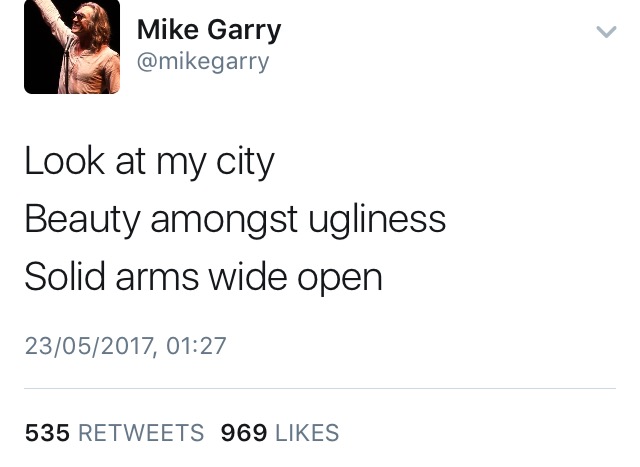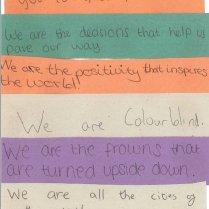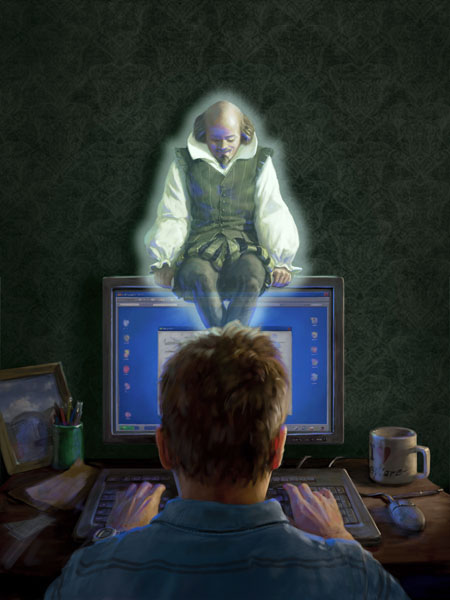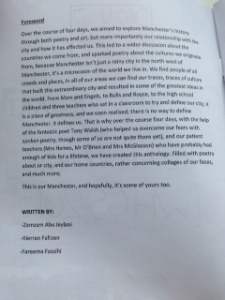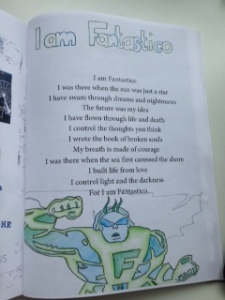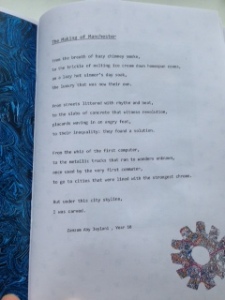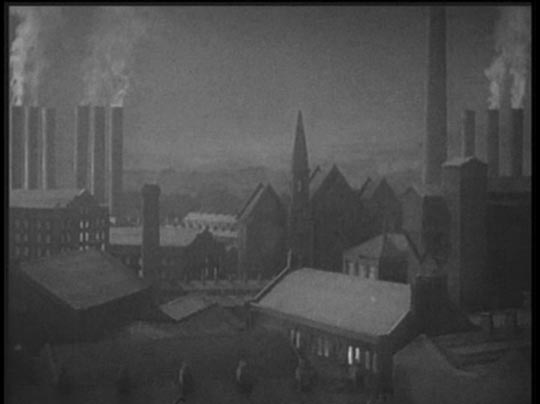
Hanky Park: the Salford skyline as depicted in the 1941 film version of Love On The Dole
I’m a firm believer that books wait for you. Like fishing in reverse, they let you pick them, pull them down from the shelf, let you start them, let you in, sometimes let you devour them in a single sitting; or they might toy with you first, snag, sometimes completely unhook you, throw you back, until you’re ready to be caught.
I first came across Walter Greenwood’s ‘Love On The Dole’ when I was in my late teens. My granddad recommended it to me, during a conversation one rainy Saturday afternoon in the pub about my beloved Smiths. I spouted my adolescent critical analysis of the entire Morrissey back-catalogue whilst he politely pretended to listen, picking the non-winners for the 3.30 at Cheltenham. He’d never heard of them, of course. But when I started dropping references to Morrissey’s influences, to Shelagh Delaney and Alan Sillitoe (as if I’d actually read them), he looked up from his paper and recommended Greenwood. My granddad wasn’t much of a reader, but he’d read Greenwood’s novel after watching the film, when it was released in the early 1940s. It strikes me now that when he read the novel, he’d have been about the age I was when we had that conversation.
My granddad was brought up in Newcastle, during the Depression. A novel, not only set in the ‘hungry thirties’, but written during it, and serving as a lasting reminder of the harrowing effects of poverty, must have struck a chord with him. Here was a novel that reflected the gaslit world he had escaped into the Army from. Though the novel is set far from Newcastle, in the gaunt underworld of 1930s Hanky Park, Salford, poverty is universal. No wonder the novel was hugely successful, Hanky Park could be Liverpool, or as easily the East End.He must have seen something of his hometown in the dark, austere streets of the novel. I never got a chance to ask him.
For me, the novel was a million miles away. My 1997 Manchester was all neon lights, Oasis and the false new dawn of Tony Blair. It was a time of optimism; the city had dusted itself off from the 1996 IRA bombing and had drawn up a plan for renewal. The Tories were a thing of the past, terrifying tales to tell your own grandchildren when the time came. So, when I picked up the novel myself (I’d borrowed it from the library – probably alongside some New Order CDs and Bez’s Biography), it didn’t resonate immediately. A few pages in and I stalled.
Now, parts of the opening are all too familiar.
On either side of (the street) are other streets, mazes, jungles, of tiny houses cramped and huddled together, two rooms above and two below, in some cases only one room alow and aloft; public houses by the score where forgetfulness lurks in a mug; pawnshops by the dozen where you can raise the wind to buy forgetfulness…
I returned to Love On The Dole only recently, years after my granddad died. This time, it was different, I was hooked. I regret not being able to share it with him. And it’s as relevant now, in post-Blair austerity Britain, as it ever was.
We can recognise in characters such as the grim Mr Pryce, the local pawnshop tyrant, and his tributary Mrs Nattle, the vultures of poverty that circle our own high streets, the payday loan companies and exchange stores that serve as sad reminders that poverty still has its unscrupulous profiteers, now more than ever. Just as our own bookies and casinos squat on the high street, booming as we grasp at straws to rescue ourselves from austerity misery, the character Sam Grundy, Greenwood’s sleazy bookmaker, appears to be one of the only characters to prosper as the others flounder in unemployment and crippling cuts to welfare. Even the thuggish Ned Narkey, almost pitiful in his ironic lack of power and influence, is irked by Grundy’s ill-gotten wealth:
Instantly he appreciated Grundy’s prosperity, its easy source, the smug complacency of the man, his affluence, influence and ability to indulge his every whim. Comparing it with his own barren indigence made his poverty doubly maddening. Blind hate and envy dominated him; his impulse was to snatch at Grundy’s throat, fling him to the floor and kick his brains out…
Greenwood shows us not only the outwardly obvious consequences of poverty: the ragged clothes, the drawn faces, the dirt and grime, poignantly illustrated in Jack Lindsay, the former apprentice, “a dismal, depressing young fellow shuffling about with a slouching gait in broken boots and shabby suit,” who, ghost-like, progresses no further than the street corner he despondently frequents; but also the deep psychological damage that poverty wields, particularly on men and on masculine identity. Ahead of his time, Greenwood alerts us to the identity-crisis men faced, and would face even moreso towards the end of the century, as the masculine industries of coal and steel crumbled, as the foundries and pits closed, leaving a void, filled only with self-doubt and self-loathing:
It got you slowly, with the slippered stealth of an unsuspected, malignant disease. You fell into the habit of slouching, of putting your hands into your pockets and keeping them there; of glancing at people, furtively, ashamed of your secret, until you fancied that everybody eyed you with suspicion. You knew that your shabbiness betrayed you; it was apparent for all to see. You prayed for the winter evenings and the kindly darkness. Darkness, poverty’s cloak.
For Harry, the novel’s hapless hero, this frustration and despair is exacerbated of course by his relationship with Helen, his childhood sweetheart. We see him fall from the hubristic apprentice with a spring in his step to the unemployed man; we share in his panic, as he is suddenly propelled into the world of fatherhood, of responsibility, of the grinding poverty his parents are powerless to keep him from:
He was severed from the old way of life at home, now. Mother, father and sister were as strangers […] He would soon be a father himself! The thought made him scared, guiltily scared. He marvelled at Helen’s seeming composure. She did not seem at all disturbed now that they were married. He, a father though! He a silly, incompetent boy, dressed in the ill-fitting clothes of manhood.
But it’s the women of the novel, I think, that shine through. From Dorbell, Nattle and Jike, hovering around like the three witches of Macbeth, interspersing the narrative with whiskey-breathed commentaries, to my favourite, stout Mrs Bull, the hard-faced ‘uncertified midwife and layer out of the dead’. In Bull, Greenwood provides the blueprint for the fearless Northern matriarch, the Elsie Tanners and Ena Sharples of the world. In my favourite scene, Bull rebuffs the futile requests of the local ‘Good Samaritan’ clothing company rep, seeking the weekly instalment in vain:
She sat at her kitchen table, jug and glass in hand: ‘Call next week, lad. Ah broke teetotal last night,’ with assurance: ‘Ah’ll have it for y’ when y’ call agen. Mrs Cranford’s expectin’ o’ Tuesday, an’ owld Jack Tuttle won’t last week out. Eigh, igh, ho, hum! Poooor owld Jack,’ a guzzle at the glass.
Brilliantly, when the collector sulkily concedes defeat, lamenting that Bull will land him in trouble, she replies “Aach, trouble, eh? Tha’ll thrive on it when tha gets as owld as me.” This is more than comic relief that Bull lends the novel, it’s hope; it’s the grit that defies the spectre of poverty.
Arguably, it’s the women of the novel who remain the strongest, the most defiant. Whether through the shrewd business dealings of Mrs Nattle, the go-between for Pryce’s pawnshop, or Mrs Bulls’s gruff put-downs and blunt sermons (“Ah’ve had no eddication but Ah do know that there ne’er was parson breathed wot preached sermon about resurrection on empty belly, an’ mine’s bin empty many a time.”), or through Sally Hardcastle’s final sacrifice made to keep her family afloat, it’s the women who find an inner steel when things fall apart. “Gor blimey,” says Mrs Bull, “they think we’re magicians, an’ Ah ain’t sure that we ain’t.”
Ultimately, Love On The Dole is a devastating celebration of working-class resolve; on the one hand it laments and warns of the evils of poverty, yet it also reminds us that, despite the Pryces and Wonga.coms of the world, the Cash Generators or Sam Grundys, there is, to crassly paraphrase a Morrissey lyric, a gaslight that never goes out. (ouch)
I loved it. My granddad loved it, though I never got to find out why. So, if you’re lucky enough to have grandparents around and they recommend a book, read it. Even if you’re not ready. Good books will wait.
IOB 10.03.2016



